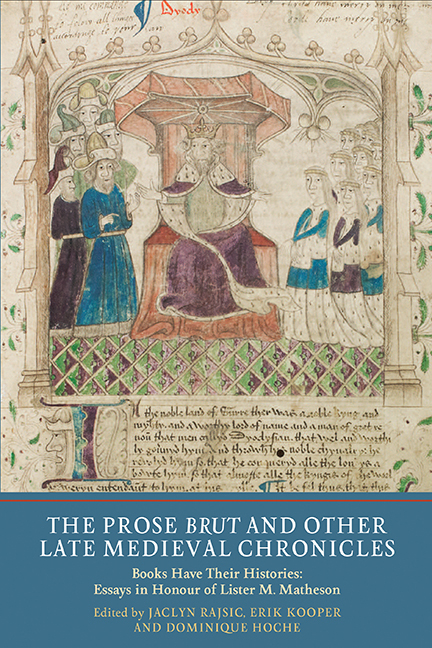 The Prose Brut and Other Late Medieval Chronicles
The Prose Brut and Other Late Medieval Chronicles Book contents
- Frontmatter
- Dedication
- Contents
- List of Plates
- List of Contributors
- Acknowledgements
- Curriculum Vitae of Lister M. Matheson
- Introduction
- A Memoir: The Whole Haggis: Lessons From the Work of Lister M. Matheson
- Part I Uses of History
- 1 Piety, Community and Local History: Le Livere de Reis de Engleterre and its Context in Cambridge, Trinity College, MS R.14.7
- 2 The Seen and the Unseen: Miracles, Marvels and Portents in the Middle English Chronicle of Nicholas Trevet
- 3 ‘And Many Oþer Diuerse Tokens …’: Portents and Wonders in ‘Warkworth's’ Chronicle
- 4 The Lawyer and the Herald
- Part II The Prose Brut
- Part III Receptions and Afterlives of Late Medieval Chronicles
- Index of Manuscripts Cited
- General Index
- Tabula in Memoriam
4 - The Lawyer and the Herald
from Part I - Uses of History
Published online by Cambridge University Press: 05 July 2016
- Frontmatter
- Dedication
- Contents
- List of Plates
- List of Contributors
- Acknowledgements
- Curriculum Vitae of Lister M. Matheson
- Introduction
- A Memoir: The Whole Haggis: Lessons From the Work of Lister M. Matheson
- Part I Uses of History
- 1 Piety, Community and Local History: Le Livere de Reis de Engleterre and its Context in Cambridge, Trinity College, MS R.14.7
- 2 The Seen and the Unseen: Miracles, Marvels and Portents in the Middle English Chronicle of Nicholas Trevet
- 3 ‘And Many Oþer Diuerse Tokens …’: Portents and Wonders in ‘Warkworth's’ Chronicle
- 4 The Lawyer and the Herald
- Part II The Prose Brut
- Part III Receptions and Afterlives of Late Medieval Chronicles
- Index of Manuscripts Cited
- General Index
- Tabula in Memoriam
Summary
AMONG fifteenth-century English chronicles, perhaps the most fascinatingly circumstantial are two that convincingly narrate events during the political and military struggles of King Edward IV from the point of view of eye-witnesses. The first, The Chronicle of the Rebellion in Lincolnshire (in London, College of Arms, MS Vincent 435), is an account of Edward's three-week campaign in March of 1470 against local rebels, but, more interestingly, an account of his game of political chess against his cousin, the earl of Warwick, and his brother, the duke of Clarence, for whom the rebels are unwitting pawns. The second, The Historie of the Arrivall of Edward IV in England (in London, British Library, MS Harley 543), is an account of Edward's three-month campaign from March to May the next year against those same kinsmen (and their new ally, Queen Margaret) to regain his crown after exile in Flanders.
The texts have much in common: they are apparently official, ostensibly eye-witness, blatantly Yorkist, substantially accurate and surprisingly detailed histories; they are narrowly focused on immediate events – battles, marches, the sending of messages and the gathering of intelligence – without long-term political or historical context, which the intended readers are presumed to know.
Such similarities in two texts emanating originally from the same court within little more than a year might naturally lead scholars to speculate that a single chronicler was responsible for both. This possibility is tentatively suggested by, among others, Antonia Gransden, who, in her 1982 Historical Writing in England, writes that ‘the evidence on the authorship of the two works does not preclude the possibility, which is supported by their style, that they were by the same author’.
But as a result of the detailed and persuasive investigations of Livia Visser-Fuchs, building on the earlier work of J. A. F. Thomson and Richard Firth Green, we now know enough about the textual histories of these chronicles to complicate, though perhaps not to obviate, the question.
- Type
- Chapter
- Information
- The Prose Brut and Other Late Medieval ChroniclesBooks have their Histories. Essays in Honour of Lister M. Matheson, pp. 64 - 72Publisher: Boydell & BrewerPrint publication year: 2016


